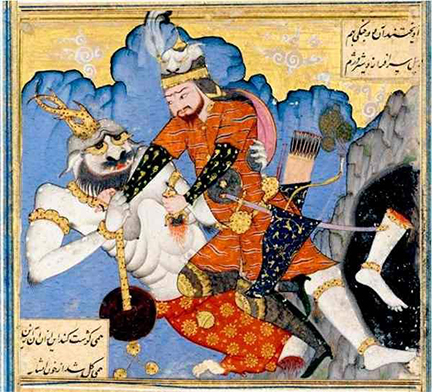Patience running out in Yemen
Jinn and Toxic

Rustam fighting a Jinn from a medieval Islamic manuscript
Anyone who has read about Aladdin knows about the genie in a lamp. The English term “genie” stems from the Arabic “jinn,” a reference to spirits in various physical forms that are said within traditional Islamic theology to have been created from fire. Artistic representations of the jinn are varied, but often show monstrous and distorted bodies. A collection of illustrations can be found online here. From our modern perch, such depictions belong to fantasy and science fiction. But literalists who seek to return to the way of thinking, although selectively, of what they think was thought at the time of the Prophet seem to believe in the jinn as part of an apocalyptic scenario for the end of the world.
While denouncing those who would walk into a bar and order gin and tonic, the extreme salafi belief in a real-life jinn is just as toxic, and not simply to one’s sobriety. I grew up in a Fundamentalist Baptist church where belief in the Devil, evil spirits and angels was prominent. It was convenient to have the Devil. a.k.a. Satan, around to explain why bad things kept happening to otherwise good people. The philosophical question of the “problem of evil” and how a just and loving God could allow such evil in the world was evaded by saying that God was allowing Satan to control the world. Life, thus, was a test and one that no one could win alone. Hence the need to put a “Jesus saves” bumper sticker on your car and condemn the “unsaved.”
There are few greater evils in the world today than belief in an unseen evil power that serves as the excuse to explain why there is so much hatred, prejudice, violence and killing. The Christian doctrine of “original sin” shifts the blame back to a naked Adam and Eve, who dared to seek the knowledge of good and evil. Islam avoids original sin, but nevertheless there have been many Muslims who justify evil in this life. Reports of ISIS fanatics who rape Yazidi women as a duty to their faith is a case in point. So is the mantra that the caliph or ruler must be obeyed, no matter how unfair, corrupt and evil he is. The old Manichean dualism of an eternal battle of good vs. evil is not only maintained, but magnified.
I wish there really were jinn and that they would show themselves so that modern day Rustam’s could battle them and conquer the fear of such beasts. It is the fear of the invisible that is the greatest fear to overcome.
Why it (Still) Makes Little Sense to Call ISIS Islamic

A member of ISIS poses in a fighter jet similar to those used in the Prophet’s time.
By Haroon Moghul, Religion Dispatches, August 24, 2015
Last week, The New York Times’ Rukmini Callimachi published “A Theology of Rape,†a report as important as it is horrifying. Unfortunately, like several recent exposés on the Islamic State in Iraq and Syria (ISIS), including Graeme Wood’s website-busting What ISIS Really Wants, Callimachi’s reporting is unusually receptive to the movement’s claims. Namely, that plausible Islamic arguments can be made for slavery, rape, and other crimes.
In support of his own argument that ISIS isn’t just “Islamic,†but “very Islamic,†Wood cited Princeton academic Bernard Haykel who insists that anyone who denies ISIS’ Islamic authenticity is being disingenuous (who says this is never elaborated on). Wood then proceeded to analyze ISIS’ “Islamicity†based almost entirely on Haykel, several fringe Muslim scholars, ISIS sympathizers, and no mainstream voices.
This is a problem. Journalist Murtaza Hussain explains that, “We invariably view conflicts involving Muslim groups as being driven primarily by atavistic religious beliefs.†Which is why, he adds, we jump to “texts and ideology to explain contemporary events. We don’t do this with the recent Israeli war on Gaza, even though that conflict also contains clear religious connotations and justifications.â€
Only weeks ago Jewish radicals lit a house on fire and burned a Palestinian child to death. Last year another Palestinian child was burned alive. Yet I don’t recall articles in the Times, the Atlantic or any other popular media assessing the act’s conformity with Judaism, or arguing that “price tag†attacks are not just “Jewish,†but “very Jewish.†There are, in fact, radical Jewish sects who preach indiscriminate violence citing G-d and the Torah, but these claims are not entertained as serious.
“ISIS,†laments Hussain, “has been granted full civilizational power to speak for and represent Islam.â€
For the rest of this article, click here.
Halal Bacon

If you are strict about halal foods or kosher foods, pork is probably not on your normal grocery shopping list. But there is something about the taste of bacon at breakfast that can be very enticing. Now, thanks to science and the long experience of folk in Iceland, there is a halal form of bacon. Well, actually it has nothing to do with swine but rather is a product of seaweed that is said to taste remarkably like bacon. So if you want to avoid haram but see no harm in enjoying the taste of bacon, stock up on seaweed.
Tunisia after the terror attacks

by Rachid Ghannouchi © Qantara.de 2015
Translated from the German by Nina Coon
A battle for freedom and dignity
In the wake of the attacks on Sousse and the Bardo Museum, Tunisia has to stand up to those who oppose the nation’s democratic development. The best way to counter the feelings that draw young people to extremism, writes Rachid Ghannouchi, chairman of the Ennahda Party, is to ensure participation, fair economic growth, and security without restricting the country’s hard-won freedoms
On 4 July, the United States celebrated the attainment of freedom and independence as it does every year. In Tunisia, 4 July also marked a turning point on the path to freedom and democracy – but not in the positive sense. On this day, Tunisian President Beji Caid Essebsi felt compelled, in response to the growing threat of terrorism, to declare a national state of emergency and curtail important personal freedoms.
The latest attack in Sousse has again made it clear just how stony Tunisia’s path to a secure democracy remains. After all, the bloodiest terrorist attack in the history of our nation seeks to destroy what we have built up in the few years since Ben Ali was ousted, namely an open society with a pluralist governmental system and a democratic constitution enshrining fundamental rights and freedoms.
Battle for the young generation
We were all horrified by the gruesome images of tourists murdered on the beach. But those images have also galvanised Tunisian citizens and their political representatives in their opposition to those who oppose our path to democracy. This battle is a battle for freedom and dignity, but first and foremost, it is a battle for the next generation, for the young people in Tunisia, but also in Libya, Syria and the entire Arab world. Continue reading Tunisia after the terror attacks
Sociology of the Arab Spring
For those interested in the issue, the recently published July issue of International Sociology (30:4) is devoted to the Arab uprisings. It includes articles on the relations of revolution to such various dimensions as space, cultural symbols, microdynamics of mobilization, political Islam, and current scholarship:
Contents
Mohammed Bamyeh and Sari Hanafi, “Introduction to the special issue on Arab uprisingsâ€
Atef Said, “We ought to be here: Historicizing space and mobilization in Tahrir Squareâ€
Zaynab El Bernoussi, “The postcolonial politics of dignity: From the 1956 Suez nationalization to the 2011 Revolution in Egyptâ€
Hatem M Hassan, “Extraordinary politics of ordinary people: Explaining the microdynamics of popular committees in revolutionary Cairoâ€
Mazhar al-Zo’by and Birol BaÅŸkan, “Discourse and oppositionality in the Arab Spring: The case of the Muslim Brotherhood in the UAEâ€
Nada AlMaghlouth, Rigas Arvanitis, Jean-Philippe Cointet, and Sari Hanafi, “Who frames the debate on the Arab uprisings? Analysis of Arabic, English, and French academic scholarshipâ€
Egypt and the Puppet Regime

Politics rules the news cycle on Islam and the Middle East. Given the colonial history of the region, there have been numerous puppet leaders installed or allowed to dangle over the years. But the latest puppet regime in Egypt, which has had its share, centers around a cosmetically enhanced widow matron that lolls around in a negligeé and talks about sex. Her name is Abla Fahita and she is a puppet in a new Egyptian tv series. She is turning heads in post-Brotherhood Egypt; if Morsy was still in power, it might very well be her own head that would have been in cinematic danger, although she has been on Youtube for several years and made an appearance on Bassam Yousif’s show. She even has her own MTVish video.
Humor has never been in short supply in Egypt, so even if her Friday night show is censored off the air, other puppets will appear. But in the meantime, if you want to laugh along with a lot of Egyptians, who are in need of something to laugh about beyond politics, just put “Abla Fahita” into Youtube, sit back and enjoy.

